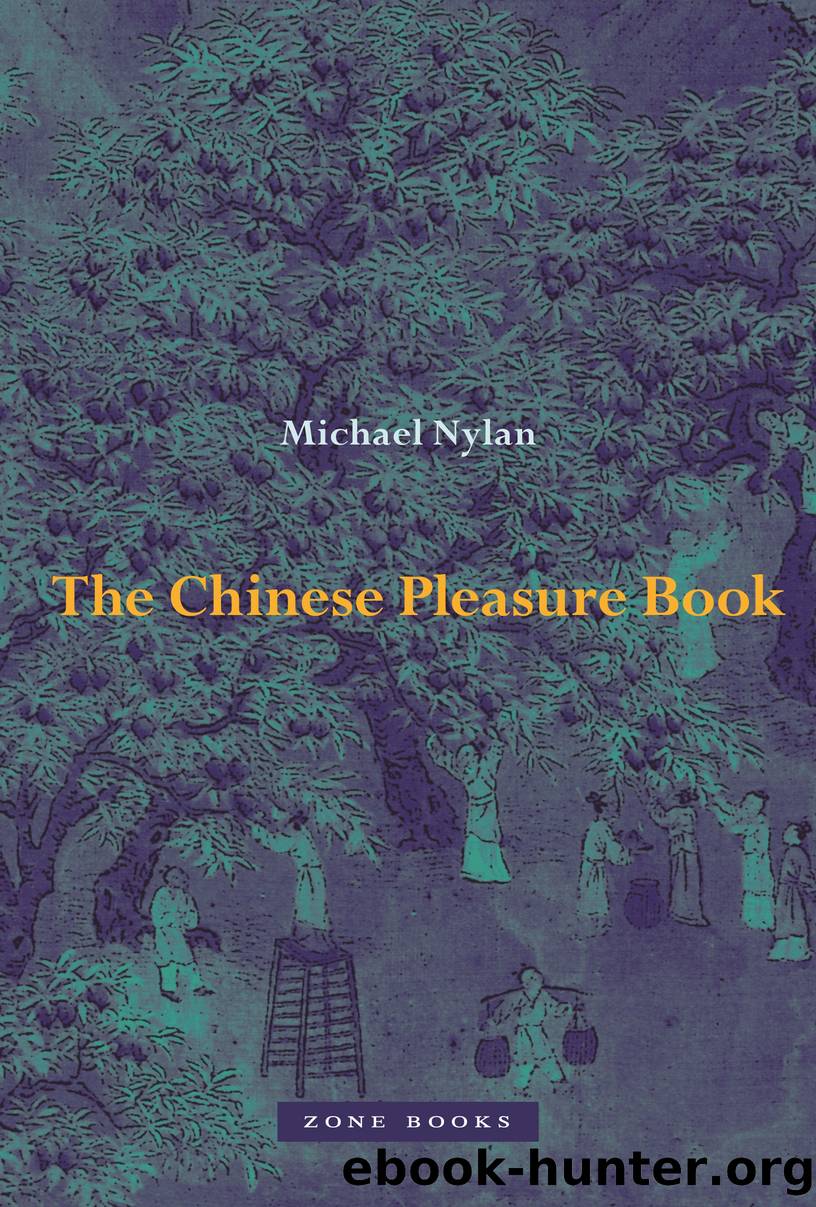The Chinese Pleasure Book by Nylan Michael;

Author:Nylan, Michael;
Language: eng
Format: epub
Publisher: Zone Books
Published: 2021-06-22T00:00:00+00:00
Paired Scenes of Instruction: Woodworker Qing and Butcher Ding
Two rather lengthy episodes in the Zhuangzi sketch the wonders inherent in a personâs being âfully presentâ (zhi ren è³äºº) to mutually affecting and transformative experiences. It is hardly coincidental that the ideal protagonists of these two stories are skilled craftsmen of relatively low status. Evidently, the insights they derive from the practice of their craft do not depend upon hereditary privilege or remarkable erudition; instead, they rely upon a strong intuitive âfeelâ for other things and people and a patience described elsewhere as an ardent waiting upon the unfolding situation (see below).11 Such experiences hardly qualify as âtranscendent,â there being no sign of the mystical, yet they do transport us to new insights. This quality of experience the Zhuangzi treats with awe, fully cognizant, on the one hand, of human limitations, but also of the human potential to partake of the sacred. So while people can never become truly spontaneous on the model of the cosmos, people can still manage, through the alternative applications of rigorous logic and of learning to let go, to untie a number of the knots that bind and chafe as they occupy their stations in life, high or low, and fulfill their social commitments. Welcome release ensues, but only through the radical deprogramming that permits the restoration of the vital qi æ°£ flow.
The two stories bear testimony to Zhuangziâs serene faith in the divine, but ineffable presences exerted within ordinary experience. Woodworker Qing outlines the extraordinary pleasures gained from being fully present to the sights around him. The more familiar Butcher Ding story describes his approaches to objects of interest, which require, for lack of better terms, a kind of withdrawal of the senses from certain things and a dramatic opening of those same percepts to others. On such foundations did Zhuangzi fashion his own distinctive views of the world, as well as of the processes that typically shape or distort peopleâs sense of reality. That ordinary habits and conventions prevent people from seeing clearly what is right before their very eyes is a continual theme in the Zhuangzi. It is in this context that I place Zhuangziâs references to âbalancing the faculties of the heartâ (qixin é½å¿, later [?] zhai xin é½å¿)12 and âquieting the mindâ (jing xin éå¿), that is, stepped withdrawals of attention from the perceptual overload that afflicts ordinary life and fragments awareness, then as now, so as to listen more attentively to the polyphonic structures of the world, perceiving the totality with a kind of clarity before responding with increased acuity and renewed purpose.
The less familiar story about Woodworker Qing, from the Outer Chapters, describes a protracted process, a deep form of engagement that might be alluded to, if not captured by the term âvision presence,â a receptivity to the divine:13
Woodworker Qing carved a piece of wood into a bell stand. When it was finished, all who saw it were awestruck, thinking it to be the work of the gods. When
Download
This site does not store any files on its server. We only index and link to content provided by other sites. Please contact the content providers to delete copyright contents if any and email us, we'll remove relevant links or contents immediately.
Verus Israel: Study of the Relations Between Christians and Jews in the Roman Empire, AD 135-425 by Marcel Simon(546)
Caesar Rules: The Emperor in the Changing Roman World (c. 50 BC â AD 565) by Olivier Hekster(519)
Infocracy by Byung-Chul Han(511)
Europe, Strategy and Armed Forces by Sven Biscop Jo Coelmont(476)
Banned in the U.S.A. : A Reference Guide to Book Censorship in Schools and Public Libraries by Herbert N. Foerstel(443)
Reading Colonial Japan by Mason Michele;Lee Helen;(441)
The Roman World 44 BC-AD 180 by Martin Goodman(432)
Give Me Liberty, Seventh Edition by Foner Eric & DuVal Kathleen & McGirr Lisa(431)
DS001-THE MAN OF BRONZE by J.R.A(418)
The Dangerous Life and Ideas of Diogenes the Cynic by Jean-Manuel Roubineau(416)
The Oxford History of World War II by Richard Overy(413)
Introducing Christian Ethics by Samuel Wells and Ben Quash with Rebekah Eklund(406)
Imperial Rome AD 193 - 284 by Ando Clifford(404)
american english file 1 student book 3rd edition by Unknown(378)
Literary Mathematics by Michael Gavin;(372)
Basic japanese A grammar and workbook by Unknown(360)
Language Hacking Mandarin by Benny Lewis & Dr. Licheng Gu(349)
The Oxford History of the Renaissance by Campbell Gordon;(330)
How to Reach the 9.0 in IELTS Academic Reading by IELTS Medical(329)
